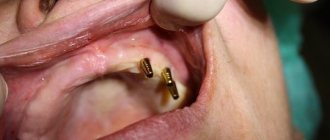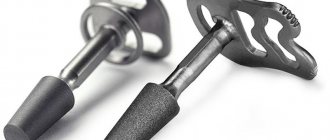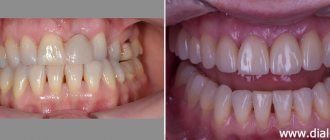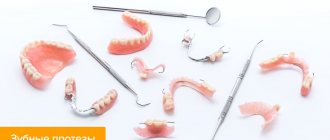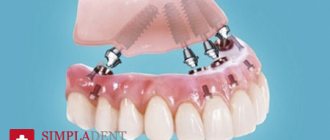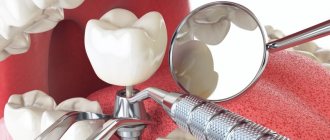What does basal dental implantation mean?
This term refers to the technique of implanting special implants not just into the jawbone, as with classical implantation, but into its deep parts. The term basal in the name of the technique indicates that the implant penetrates the basal layer of the bone. The peculiarity of the technique is that it allows prosthetics to be performed in a fairly short period of time - within one week, or even less.
Patients in dental clinics should also know the alternative names for basal implantation: transgingival, single-stage, minimally invasive, single-phase or implantation with immediate loading.
The main point of the basal method of dental implantation is the very rapid restoration of chewing load - the installed dentures can be loaded within 3-5 days after completion of all procedures. As part of the technology, the dental surgeon also uses the zygomatic bone to securely fix the implants in the jaw (when replacing the upper jaw). When placing implants, the force lines of the skull are taken into account, which allows for optimal distribution of the load on the prostheses.
Basal dental implantation allows the patient to save time compared to conventional implantation. With the classical scheme of prosthetics on implants, from the moment of installation of the implant to prosthetics takes from 3 to 6 months, and with basal implantation - from 3 to 5 days. But fast does not always mean high quality, and any patient may face the problem of basal implant rejection within a couple of months.
We note the rapid growth of patient interest in basal implantation and would like to meet their expectations. But! Having carefully studied the issue of basal implantation, we came to the conclusion that the technique is too ambiguous. In addition, in most European countries, where this method is supposedly actively used, it has almost been abandoned due to the high risk of complications. This is why basal implantation is not encouraged or used at Dent Academy - we try to follow European recommendations.
When is basal implantation used?
Indications for basal implantation are:
- All cases where there is a patient’s fear of bone grafting, and the doctor is inclined to speculate on these fears,
- Tooth loss in special social groups (both partial and complete) due to insufficient hygiene;
- Lack of funds for correction of bone tissue atrophy and full implantation,
- Fear of a patient who does not believe in the success of implantation due to intimidation with the terrible words “periodontitis, periodontal disease”;
- Tendency to believe in miracles and love of risk,
- The need for rapid restoration of the dentition;
Also, the decisive point when choosing a method for restoring a tooth is its efficiency. Many patients categorically refuse to wait many months (the process of classical implantation takes on average from 3 to 18 months) and prefer a faster treatment option - basal implantation with instant loading. However, inquisitive patients, having carefully studied the warranty section (for such work, the guarantee does not exceed 12 months), cool down and prefer treatment according to a different protocol.
Types of Basal Implants
There are two types of basal implants: disc and compression. Disc ones are not currently used, having given way to more modern compression ones.
Disc implants
During the era of basal dental implantation, disc implants, also called lateral basal implants, were developed and actively used. To install them, a rather traumatic operation was required, during which the gums were cut and the bone was sawed out. For this reason, disc basal implants were gradually replaced from clinical practice by more convenient compression ones.
Compression implants
The development of dental surgery has led to the emergence of a new generation of basal implants - compression or root-shaped. These implants are similar to conventional ones, but are larger in size, allowing them to “reach” the basal layer of bone.
Basal implants are produced in different countries and are represented on the market by a large number of manufacturers. Dental clinics usually use implants from 2-3 manufacturers - this is enough to cover the entire price range.
Dental implants: types and prices with photos
The quality of basal implants from all well-known manufacturers is approximately comparable - it is very difficult to identify the leader among them, since it is impossible to objectively compare the number of complications, service life and the presence of defects. In addition, to a certain extent, these indicators depend on the “straightforwardness” of the doctor installing the implant. Therefore, briefly about implants from well-known manufacturers:
- Nobel Biocare (Switzerland). The implants of this company are made of titanium, which has a high degree of biocompatibility. The external coating of Nobel implants is represented by TiUnit material, which is titanium oxide enriched with phosphorus and has a high degree of crystallization. This coating provides moderate surface roughness of the implant, which increases their survival rate and reduces adaptation time. Nobel Biocare is one of the leaders in the production of implants and equipment for implantology; the company provides a lifetime guarantee on its products. The quality of the product also corresponds to the price - the cost of an implant for basal dental implantation starts from 60,000 rubles.
- Straumann Roxolid (Switzerland). This company uses a special alloy in the production of its implants, which in some respects is not inferior to titanium. Dental implants from Straumann Roxolid are thin, short implants with a special coating that facilitates installation in patients with several concomitant diseases. The price of these implants is slightly lower than the prices of flagships from Nobel - the average cost of one Straumann Roxolid implant is 50,000 rubles.
- Oneway Biomed (Switzerland). Biomed implants are recognized leaders around the world among all immediate loading implants. The Immediate Load implantation protocol developed by the company in addition to implants made the prosthetic procedure so convenient that many implantologists with conservative views began to introduce it into their practice. Biomed implants are distinguished by a super-smooth surface that prevents the absorption of microorganisms. These implants are suitable for prosthetics in the most advanced cases - in patients with severe atrophy of the jaw bone tissue and severe periodontitis. With the cost of one Biomed implant being 25-35 thousand rubles, basal dental implantation of one jaw will cost about 200,000 (all-in-6 or all-in-4 protocol).
- Noris Medical (Israel). The implants from this manufacturer are focused on zygomatic (zygomatic) implantation, so their length exceeds the length of all other implants. In more than half of cases, zygomatic implantation is associated with the need to compensate for bone tissue deficiency. In this regard, Noris Medical offers doctors complete systems that include all the necessary components. The price of basal dental implantation with upper jaw prosthetics using all-in-6 or all-in-4 protocols using implantation systems from Noris Medical can reach several hundred rubles (this is the cost of zygomatic implantation of the upper jaw).
- Ankylos (Germany). The popularity of this company's products is due to their lower price category. The design features of implants from this manufacturer reduce the likelihood of their loosening. In the manufacture of implants, the patented FIRADENT Plus technology is used, thanks to which, after installation, more active formation of bone tissue is observed in the peri-implant space.
- BioHorizons (USA). The fame of this American brand is due to some extent to the fact that the company has developed a special coating for its implants - Laser-Lok. Thanks to it, the fusion of the implant with the bone tissue is accelerated. The company also patented the TeethXpress technique, which is a modification of All-on-6 and is intended for complete jaw replacement. This technique has only one drawback - for high-quality prosthetics it requires absolute parallelism between the implants, which cannot always be ensured in case of severe atrophy of bone tissue.
- Osstem Implant (South Korea). The South Korean company is one of the top 5 manufacturers of dental implants and implantation systems, accounting for 80% of the South Korean market. The company's products are quite affordable - the cost of one implant is 20,000 rubles. Since 2006, Osstem has been producing implants at its plant in the USA and selling them under the HIOSSEN brand.
Advantages of the method
The main advantages of this method of restoring dentition include:
- Efficiency;
- Low-traumatic (implantation is carried out without incisions and sutures);
- Fast recovery period;
- Restoring aesthetic function in a short time;
- Possibility of carrying out even with pronounced atrophic processes in bone tissue;
Pros and cons of basal implantation
Dental prosthetics based on the basal implantation technique is a very controversial technique, which has more significant disadvantages than advantages. It is most often offered in cases of complete edentia, when absolutely all teeth are missing on one jaw. Basal dental implantation is used in cases of severe atrophy of bone tissue without prior augmentation.
Basal implants are installed faster than usual, and the patient receives the desired effect in the form of restored dental integrity in the shortest possible time. However, this is accompanied by a fairly high risk of implant failure in the early stages.
Dentures on basal implants, however, as well as on conventional ones, do not require special care - it is enough to brush your teeth as usual or use an irrigator. When using all-in-4 and all-in-6 dentures, a small gap is usually left between the denture and the gum to facilitate oral care, which can be easily cleaned with a simple rinse.
Basal implantation is impossible without the use of computer technology - before the procedure, the implantologist must create a 3D model based on a CT scan of the jaw, which will help calculate the installation of implants. Unfortunately, many doctors neglect this need, saving on software, which leads to very sad results.
So, let’s briefly note the advantages of basal dental implantation:
- quick installation;
- the patient gets the opportunity to return to a normal lifestyle - chewing function is quickly restored, the cosmetic defect (lack of teeth) and the resulting psychological discomfort disappear;
- there is no need to build up bone tissue in case of severe atrophy;
- bone tissue regenerates faster due to immediate load on it;
- lower cost compared to alternative prosthetic methods.
Disadvantages of basal implantation
Doctors at Dent Academy are proficient in all methods of prosthetics, and we do not need to praise one method at the expense of another. Therefore, we will also talk about the disadvantages of basal prosthetics. And you will understand why this technique is not used in our clinic.
One of the serious disadvantages that should be immediately noted is the rather high complexity of the procedure itself - not every doctor is able to perform basal implantation. Specialists proficient in this technique must first undergo training at the International Implant foundation, ultimately receiving a certificate. A doctor who knows this technique is both an orthopedist and a maxillofacial surgeon rolled into one. Our clinic has specialists who have completed all the necessary training, but this does not allow them to abuse the trust of patients and offer them a rather dangerous technique.
Important! In case of rejection of the basal implant, the patient will still have to resort to classical implantation with sinus lift. And this happens quite often, which is why we do not use this method of prosthetics.
How is basal implantation performed?
After losing teeth for any reason (trauma, oral disease), it is very important to consult with an experienced dentist as soon as possible. After all, tooth loss is not only an aesthetic problem; after it, the normal structure of the dentition is disrupted, atrophy of the gum bone tissue occurs, and all the necessary conditions arise for the spread of pathological processes in the oral cavity. To restore your teeth, you should go for an initial consultation on implantation with a surgeon. The doctor will conduct all the necessary studies and recommend the best treatment option. If you are not bound by a time frame and prefer implantation with a guarantee, then the surgeon will never perform basal implantation.
Basal implantation takes an average of one week, and the number of doctor visits varies from three to five. Before implantation, a thorough preparation of the oral cavity is carried out, which consists of treating existing pathologies of teeth and gums, removing teeth and roots in the area of the upcoming implantation. One of the main competitive advantages of basal implantation is the absence of the need for bone grafting; the implant can be installed even immediately after tooth extraction in the interradicular septum. The installation of prostheses occurs 4-5 days after the insertion of the implants and thus the entire process takes no more than one week.
Indications and contraindications for basal prosthetics
Supporters of basal implantation are trying to present this technique as almost a panacea and the list of indications for it is very large. We are not supporters of this method, so we cannot recommend it in any situation.
“The practice of using basal implantation in European countries has shown that it can cause too much damage to the patient’s health. Therefore, in some countries this method was banned at the state level.”
Chief physician of the Academy of Dent Sadov Igor Yuryevich, a specialist with more than 20 years of experience, member of the European Association of Implantologists, member of the International Congress of Dental Implantologists.
The list of contraindications to this method is quite extensive:
- oncopathology;
- decompensated diabetes mellitus;
- tuberculosis;
- untreated arterial hypertension;
- severe disorders of the coagulation system (hypocoagulation);
- pronounced hypertonicity of the masticatory muscles.
Ages under 22 years are a contraindication for this implantation method, since until this age the growth and formation of bones, including jaws, continues
This is interesting! Smoking is a relative contraindication to any type of implantation, due to the fact that smokers have almost 5 times lower chances of successful implantation. This is due to the fact that long-term smoking leads to a decrease in bone density, deterioration of microcirculation in tissues, and slower regeneration. Unscrupulous marketers claim that basal implantation is more effective in smokers, but there is no confirmation of this fact - the percentage of rejection of basal implants in this category of patients is no higher than the percentage of rejection of conventional ones.
Main contraindications
Basal implantation is carried out only for those patients who have lost three or more teeth. Other contraindications to the procedure include:
- Acute inflammatory and infectious diseases;
- Diseases associated with metabolic disorders (decompensated form of diabetes mellitus, hyperthyroidism and others);
- Diseases associated with disorders of the blood coagulation system;
- Immunodeficiency conditions;
- Oncological diseases;
- Pregnancy;
- Severe pathologies of the nervous and cardiovascular systems;
Since the basal implantation technique itself is unpredictable, before deciding to carry out basal implantation, the dentist must assess the patient’s general health, weigh the possible risks and, if there are contraindications, recommend another treatment method.
Basal prosthetics for complete absence of teeth - price
Many clinics promote basal implantation as a cheaper method of dental prosthetics for completely edentulous patients. Indeed, even a superficial analysis of the prices for these two methods shows: the average price of one tooth restored using classical implantation in Moscow is about 40-45 thousand rubles, and when restoring the entire jaw using basal implantation, the price of one tooth is about 20 thousand.
The cost of prosthetics for the entire jaw will largely be determined by the implants chosen by the patient: if you choose budget models, it will be possible to keep within 200,000, and if you choose premium implants, the price for basal implantation in Moscow can be 500,000 rubles.
We urge our patients not to chase cheapness and approach the choice of prosthetics method with all seriousness. Despite the fact that we do not use basal implantation, we will select a method of prosthetics for any patient, taking into account his financial capabilities. In this case, the main selection criterion will be health safety!
(implantation with instantaneous loading)
The loss of one or more teeth is an absolutely solvable problem in modern dentistry, which has an effective method of restoring teeth using various types of implantation. Currently, due to aggressive advertising, basal implantation (also called implantation with instant loading) is of particular interest among patients.
If you believe the advertising, then thanks to this method you can quickly and reliably restore lost teeth, fully restore the chewing function and the beauty of your smile.
